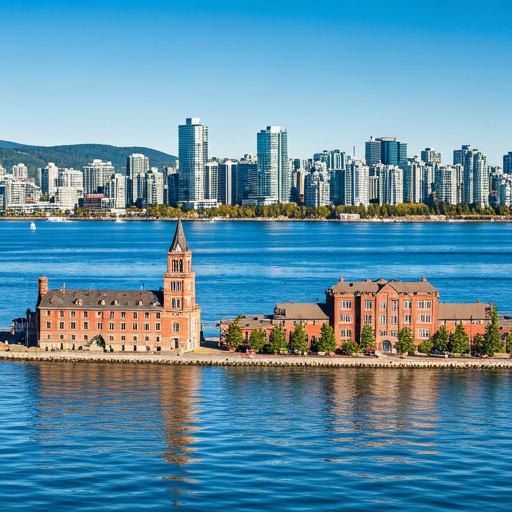Having lived for several years in Halifax, Nova Scotia, and now calling Vancouver, BC, home for the past 20 years, I’ve had the privilege of experiencing two cities that offer completely different lifestyles, climates, and real estate markets. Both cities are gems in their own right, but when it comes to home prices, cost of living, safety, and weather, the differences are vast. Let’s dive into what sets these two cities apart.
Home Prices: Affordable Halifax vs. Pricey Vancouver
One of the starkest differences between Halifax and Vancouver is the cost of real estate:
Halifax: The median home price in Halifax is around $440,000 CAD as of late 2024. For this price, you can purchase a spacious detached home in a quiet suburban neighborhood, complete with a yard—perfect for families.
Vancouver: The median home price exceeds $1.2 million CAD, making even modest homes far more expensive than their Halifax counterparts. A detached home in Vancouver is a luxury, while $440,000 might get you a small condo or townhouse in the suburbs.
What does this mean for buyers?
For the same budget, you could enjoy a larger property with more space and privacy in Halifax, while in Vancouver, you’re likely trading size for proximity to urban amenities and the natural beauty of the Pacific Northwest.
Cost of Living: Maritime Affordability vs. West Coast Luxury
Beyond real estate, the cost of living highlights the affordability gap between these two cities:
Utilities: Halifax boasts relatively low utility costs, averaging $250/month, while Vancouver’s rates often climb higher, nearing $300/month or more.
Transportation: Halifax’s smaller size and manageable traffic make commuting more affordable. Parking costs and gas prices are also lower. In Vancouver, public transit is efficient but can get pricey, and driving comes with higher fuel costs and hefty parking fees.
Dining Out: A meal for two at a mid-range restaurant in Halifax might cost around $60 CAD, while in Vancouver, expect to pay closer to $90 CAD.
While Vancouver offers world-class dining, cultural events, and outdoor experiences, the cost to enjoy these amenities can be significantly higher than in Halifax, where life is more laid-back and budget-friendly.
Safety and Crime Rates
Both cities are relatively safe, but there are notable differences in crime rates and safety perceptions:
Halifax: As a smaller city, Halifax experiences lower crime rates overall, particularly violent crime. However, like any urban center, it has pockets where property crime and theft can occur. The community-focused nature of Halifax often fosters a sense of safety and belonging.
Vancouver: Vancouver is generally safe, with low rates of violent crime compared to other major cities. However, property crime is a recurring issue, especially in neighborhoods with high tourist traffic or near the Downtown Eastside, which also grapples with homelessness and drug use.
For families or individuals seeking a quieter, safer environment, Halifax might feel more secure. Vancouver, while safe overall, requires some consideration of neighborhood dynamics when choosing a place to live.
Weather: Maritime Seasons vs. Coastal Rainforest
Weather is another significant factor when comparing Halifax and Vancouver, and it often influences how people perceive quality of life:
Halifax: The city experiences four distinct seasons. Winters can be cold and snowy, with temperatures often dipping below freezing. Summers are warm and humid, with average highs around 25°C. Spring and fall bring a mix of cool, crisp days and rainfall. Halifax’s coastal location also means occasional nor’easters and strong winds.
Vancouver: Known for its mild climate, Vancouver rarely experiences extreme temperatures. Winters are rainy, with average lows around 3°C, and snow is a rare occurrence in the city itself (though the nearby mountains are a winter wonderland). Summers are mild and pleasant, with temperatures averaging around 22°C. Vancouver’s weather is ideal for those who dislike harsh winters but don’t mind rain.
If you enjoy snowy winters and the changing of seasons, Halifax offers a classic Canadian experience. If you prefer milder, rainier winters and comfortable summers, Vancouver’s climate is hard to beat.
Quality of Life: East Coast Charm vs. West Coast Sophistication
Both cities boast incredible quality of life, but they cater to different lifestyles:
Halifax: Known for its maritime charm, Halifax offers a tight-knit community feel, historic neighborhoods, and a slower pace of life. Outdoor enthusiasts can enjoy sailing, hiking, and exploring the rugged Atlantic coastline. The city’s affordability and relaxed vibe make it appealing for families and retirees.
Vancouver: Vancouver combines urban sophistication with stunning natural surroundings. From world-class dining and cultural events to skiing and hiking, the city offers endless activities. However, its fast-paced lifestyle and high cost of living can feel overwhelming for some.
Which City is Right for You?
Deciding between Halifax and Vancouver depends on your priorities:
Halifax: Perfect for those seeking affordability, a strong sense of community, and a traditional Canadian experience with distinct seasons.
Vancouver: Ideal for individuals who value urban amenities, cultural diversity, and year-round access to mountains, beaches, and mild weather—provided they can manage the cost.
My Takeaway as a Realtor
Having lived in both cities, I understand the unique benefits each offers. Halifax holds a special place in my heart for its charm, affordability, and community spirit. Vancouver, on the other hand, captivates with its breathtaking landscapes, opportunities, and dynamic culture.
At Canadian Pacific Homes, we’re here to help you navigate these decisions, whether you’re looking to relocate, invest, or simply explore your options. Let’s work together to find the perfect home that aligns with your lifestyle and goals.
Reach out today—whether your heart is set on the Atlantic or the Pacific, we’ll help you find your perfect place to call home!



Comments:
Post Your Comment: